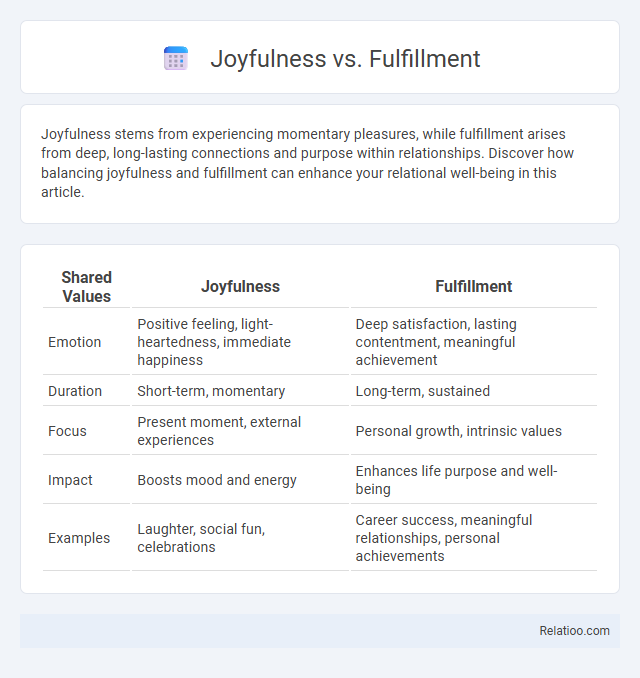Joyfulness stems from experiencing momentary pleasures, while fulfillment arises from deep, long-lasting connections and purpose within relationships. Discover how balancing joyfulness and fulfillment can enhance your relational well-being in this article.
Table of Comparison
| Shared Values | Joyfulness | Fulfillment |
|---|---|---|
| Emotion | Positive feeling, light-heartedness, immediate happiness | Deep satisfaction, lasting contentment, meaningful achievement |
| Duration | Short-term, momentary | Long-term, sustained |
| Focus | Present moment, external experiences | Personal growth, intrinsic values |
| Impact | Boosts mood and energy | Enhances life purpose and well-being |
| Examples | Laughter, social fun, celebrations | Career success, meaningful relationships, personal achievements |
Understanding Joyfulness: Definition and Key Traits
Joyfulness is characterized by a spontaneous and uplifting emotion marked by lightness, energy, and a positive outlook on life. Key traits include a sense of playfulness, immediate happiness, and an outward expression of delight that often arises from external experiences or small moments. You can cultivate joyfulness by embracing gratitude, savoring present moments, and seeking activities that naturally spark pleasure and enthusiasm.
What Is Fulfillment? Unpacking Its Core Meaning
Fulfillment is a deep sense of satisfaction and completeness that arises when your core values and long-term goals align with your actions and achievements, differentiating it from the fleeting nature of joyfulness or happiness. While joyfulness often relates to temporary emotions and moments of pleasure, fulfillment embodies a sustained state of purpose and contentment. Understanding fulfillment involves recognizing its root in meaningful accomplishments and intrinsic rewards that contribute to your overall well-being.
Emotional Differences: Joyfulness vs Fulfillment
Joyfulness is characterized by a spontaneous and intense emotional response, often triggered by external events, resulting in short-lived feelings of happiness and excitement. Fulfillment, in contrast, is a deeper, sustained emotional state rooted in achieving meaningful goals and a sense of purpose, providing long-term contentment. While joyfulness fluctuates with momentary experiences, fulfillment arises from consistent personal growth and alignment with core values.
The Role of Purpose in Fulfillment and Joy
Purpose plays a crucial role in distinguishing fulfillment from joyfulness, where fulfillment arises from pursuing meaningful goals aligned with Your values, creating a deep and lasting sense of satisfaction. Joyfulness, often characterized by spontaneous moments of happiness, can be experienced without a strong sense of purpose but lacks the enduring impact of fulfillment. Understanding this difference helps You cultivate a purposeful life that balances short-term joy with long-term fulfillment.
Short-Term Joy vs Long-Term Fulfillment
Short-term joy often stems from immediate pleasures like social interactions or indulgent experiences, providing a burst of positive emotion that quickly fades. Long-term fulfillment arises from sustained efforts toward meaningful goals such as career achievements, personal growth, or deep relationships, fostering lasting satisfaction and purpose. Your ability to balance fleeting joy with enduring fulfillment can significantly enhance overall well-being and life satisfaction.
Can You Experience Both Joy and Fulfillment?
Experiencing both joy and fulfillment involves recognizing their distinct emotional landscapes: joy is a spontaneous, intense feeling of happiness, while fulfillment is a deep, lasting sense of purpose and satisfaction. Your ability to cultivate joy through everyday moments complements the ongoing pursuit of fulfillment derived from meaningful goals and values. Balancing these emotions enhances overall well-being, allowing you to live a vibrant and content life.
Psychological Benefits of Joyfulness
Joyfulness significantly enhances psychological well-being by triggering the release of endorphins and dopamine, which reduce stress and improve mood stability. Unlike fulfillment, which is rooted in long-term goal achievement and personal growth, joyfulness provides immediate emotional uplift and resilience against anxiety and depression. Experiencing joyfulness regularly fosters social connectivity and increases overall life satisfaction through positive emotional states.
How Fulfillment Impacts Life Satisfaction
Fulfillment deeply influences life satisfaction by fostering a sense of purpose and long-term contentment beyond momentary joyfulness. While joyfulness offers immediate happiness, fulfillment builds resilience and meaning, enhancing your overall well-being and happiness sustainably. Prioritizing fulfillment cultivates lasting satisfaction that supports mental health, motivation, and a richer life experience.
Practical Ways to Cultivate Joyfulness and Fulfillment
Cultivating joyfulness involves engaging in activities that bring spontaneous happiness, such as practicing gratitude and savoring small pleasures, which can boost your emotional well-being. Fulfillment requires setting meaningful goals aligned with your values, fostering a sense of purpose and long-term satisfaction through personal growth and contribution. Combining mindfulness techniques with regular reflection helps you balance immediate joyfulness and deeper fulfillment for a more enriched life experience.
Choosing Between Joyfulness and Fulfillment: Which Matters More?
Choosing between joyfulness and fulfillment depends on individual values and life goals, as joyfulness offers immediate emotional pleasure while fulfillment provides long-term satisfaction and purpose. Studies in positive psychology reveal that fulfillment correlates with sustained well-being and resilience, whereas joyfulness enhances moment-to-moment happiness. Balancing both concepts can lead to a richer, more meaningful life experience.

Infographic: Joyfulness vs Fulfillment
 relatioo.com
relatioo.com